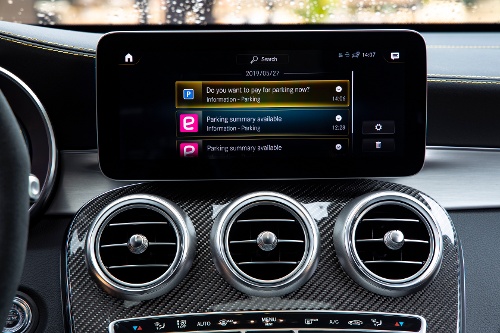Why comprehensive, accurate and granular geo-data is critical for in-car commerce

In-car commerce is the new thing for the connected car, and many car manufacturers, system suppliers, as well as e-commerce companies, are working on solutions. There is a lot of talk about in-car marketplaces that offer drivers the ability to transact using the vehicle as the device rather than the smartphone. There are consumer-centric merchants such as Starbucks or Dunkin' Donuts, and there are vehicle-centric services such as tolling, fuel, EV charging, and of course, parking. Parkopedia focuses on the vehicle-centric services with parking at the core, as these are the services that are most in-demand by the drivers behind the wheel. There is a lot of value car manufacturers can generate by deeply integrating commerce transactions with their vehicles - something that the 3rd party providers will not be able to do with Apple CarPlay or Android Auto.
Parkopedia is the leading provider of in-car commerce solutions for parking. What we clearly see is that while parking data is necessary for vehicle-centric in-car commerce today, it becomes absolutely critical for automated transactions in the future.
In-car parking transactions need coverage, context, and choice for the consumer. The most common use cases for in-car parking payments are parking “reservations” or “bookings” where drivers pre-pay for their parking space use ahead of arriving at the parking location and "on-demand payments" where drivers are paying for the space that they are already parked in.
Parking Reservations
For in-car use cases, drivers want to get the full picture of what is available in parking, off- and on-street, in order to make a decision whether to pre-book a parking space in a garage. Limiting the driver experience to bookable locations carries high risk. The number of bookable locations has grown over the past years and has reached up to two thirds of all off-street locations in major cities such as New York, Chicago, or Washington DC. However, the total number of bookable locations is still only at 15% of the total number of off-street parking venues in the US market with many parts of the country not covered at all: Only 350 of the top 1,000 cities in the US have at least one bookable parking location today. Coverage in Europe is even worse with only a handful of countries supporting parking reservations in relevant numbers. In the countries and cities with no bookable locations, drivers will have to turn to other applications to find parking, giving additional incentives not to use the in-car systems.
Comprehensive parking information coverage is one critical component for a good in-car experience. The context, however, is also very important: Will my car fit in this parking space? Can I pay with my credit card? Will it still be open after my dinner? Full street and off-street parking lot coverage with detailed information on opening hours, height restrictions, amenities etc is necessary to provide drivers with their best parking options.
Finally, bookable locations only provide information on whether a space can be booked, which is very different to the overall availability of a parking venue. There may not be any bookable spaces left, but you could still park there and on the other hand, a parking reservation does not guarantee a space in a location that is completely full. Car manufacturers risk strong consumer dissatisfaction, when drivers find out that there was a cheap parking garage right next to their destination when they were led to pre-pay and park at a more expensive location 5 blocks away. Even in New York or other major cities, this is not such a far fetched scenario, as 35% of garages are not bookable and in many cases they are the cheaper locations. Therefore, limiting the driver’s choice to bookable locations is likely to backfire and to erode consumer trust in the service.
On-demand Payments
On-demand parking payments are another example of how in-car transactions require highly granular parking data to enable a superior user experience. The vehicle needs exact data broken down per street segment (and the correct side of the street) to determine, whether street parking is paid, which payment provider is relevant and what the fees and restrictions are. The mobile parking payment providers usually do not have such data as simply locating their users somewhere inside a paying zone is sufficient for the smartphone use case. The details on whether a specific street segment is paid or not or what zone a car is parked in is the driver’s responsibility. This is very different in automated in-car use cases. The driver expects the service to operate flawlessly without his intervention, which requires comprehensive, accurate and granular parking data.
Similarly to parking reservations, on-demand payment enabled locations only cover a fraction of the overall parking inventory. Most of paid street parking might be covered by one or more parking payment providers, but free street parking locations or all of the off-street parking locations will not be part of such a system.

Parking Recommendations
Drivers want the comprehensive overview of the parking choices, but they do not want to get flooded with information. Just like in any other e-commerce domain, recommendations will help solve that problem. This is particularly relevant for in-car scenarios where the user will have a hard time scrolling through a list of parking locations on a screen. Effective and trustworthy recommendations require a complete dataset of granular and comprehensive parking data. By collecting more than 80 data attributes for every parking location and generating the analytics around them, Parkopedia enables highly personalized recommendations for the driver.
Summary
The more frictionless and automated in-car transactions are, the higher the benefits are for the driver and the car manufacturer. The in-car systems of the future have to rely on comprehensive, accurate and granular information to support the highly automated parking transactions, as well as payments for tolling, EV charging or other vehicle centric services. Great data is the necessary precondition for a great user experience... and, bad user experience is something a car manufacturer cannot afford.
Hans's main responsibilities include driving sales and marketing, as well as managing operations globally.
.png?width=1960&height=1103&name=parkopedia%20logo%20+%20arrive%20(1).png)